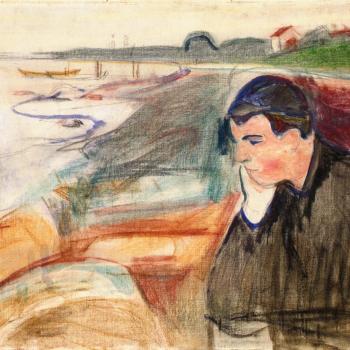To clarify, here is how Marx defines commodity fetishism:
There is a physical relation between physical things. But it is different with commodities. There, the existence of the things qua commodities, and the value relation between the products of labour which stamps them as commodities, have absolutely no connection with their physical properties and with the material relations arising therefrom. There it is a definite social relation between men, that assumes, in their eyes, the fantastic form of a relation between things. In order, therefore, to find an analogy, we must have recourse to the mist-enveloped regions of the religious world. In that world the productions of the human brain appear as independent beings endowed with life, and entering into relation both with one another and the human race. So it is in the world of commodities with the products of men’s hands. This I call the Fetishism which attaches itself to the products of labour, so soon as they are produced as commodities, and which is therefore inseparable from the production of commodities.
Marx has a rather complicated definition of a commodity, but the simple point is that under capitalism most everything ends up becoming one (arguably memes are not really commodities, but that doesn’t much detract from the point; we’ve certainly reached the point where intellectual property has been commodified). These commodities develop auras all their own. A famous example of such an effect is Coca-Cola. Coke doesn’t really quench thirst; its utility is more-or-less unrelated to why we drink it. It’s simply developed a significance that cannot be reduced to utility. The same can be said for modesty memes and modesty discourse. “Hot” pictures of veiled women, memes comparing “ugly” feminists to “attractive” traditional women—these are modes of fetishization that excite a response within the reader or viewer. The idea is to make modesty “hot,” when per Aquinas and the Catholic Encyclopedia modesty (especially outside marriage) is the opposite of a fetish; it exists to rein in any possibility of excitement.
This is why, though the medievals do speak of modesty in approving terms, when they wanted to call a woman attractive, they just did it. Here is Chaucer in the high style of romance (forgive the prose translation; it breaks my heart to use one, but it gets the point across):
This passed on by day and by year until it happened, once upon a May morning before daybreak, that Emily, who was fairer to see than the lily upon its green stalk, and fresher than May with its new flowers (Her cheeks competed with the rose–I know not which was the fairer.) Emily, I say, as was her custom, had arisen and was already dressed, for May will have no sluggishness at night. The season pricks every gentle heart and arouses it out of sleep and says, “Arise, and make your observance.” Thus Emily remembered to rise and do honor to May. She was freshly clothed and her yellow hair was braided in a tress behind her back, a yard long, I believe; and in the garden at sunrise she walked up and down gathering the red and white flowers at will, to make a delicate garland for her head; and she sang heavenly, like an angel.
The troubadours often just sound dumbstruck and terrified as they begin to approximate the beauty of things like lips and glances:
All joys are humbled, all must dance
To her law, and all lords obey
My lady, with her lovely way
Of greeting, her sweet pleasant glance,
A hundred years of life I’d grant
To him who has her love in play.Her joy can make the sick man well,
And through her anger too he dies,
And fools she fashions of the wise,
And handsome men age at her spell,
And status, wealth she can dispel
And raise the beggar to the skies.Since man can find no better here,
That lips can tell of, eyes can see,
I wish to keep her close by me.
To render my heart fresh and clear,
Renew the flesh too, so the sere
Winds of age blow invisibly.
My point here is not to say the medievals had it right (though they do have a charm). Rather, it’s to show that Traditionalists, in certain circumstances, may have perverted the very thing they’ve sought to recuperate, that the “bringing back” of modesty may, in fact, be mere lust in another form. If the goal is not to objectify women, the plan seems to have failed. In using the means of our society, the society seems to have taken them, and, in doing so, they may have validated one of my constant points here on the blog: that Marx is worth taking seriously, even as, and sometimes especially as, an orthodox Catholic.

















